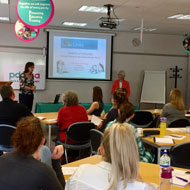
Sessions offer advice on establishing a practice protocol
A new CPD course for veterinary professionals has been launched to provide advice on coping with cases of suspected animal abuse.
Organised by the BSAVA and the Links Group, the Links Veterinary Training Initiative comes in response to increasing research showing a link between violence to animals and violence towards humans.
“Suspecting animal abuse can be an alarming and sensitive issue to confront but our training courses should give veterinary teams the skills and support they need to help deal with such cases,” said Jennie Bartholomew, education coordinator at the BSAVA.
Each session offers advice on establishing a practice protocol and selecting a Safeguarding Liaison Officer (SLO), who will assist practice staff in suspected abuse cases. Through the SLO, relationships can be formed with RSPCA officers, police domestic abuse officers and aid agencies, giving staff support to call on if they suspect something might not be right.
Past BSAVA president and course lecturer Freda Scott-Park said: “There are few veterinary practices that do not encounter animal abuse, not daily, but the incidence is increasing. Cases can be quite complicated to diagnose but often vets find they develop a sixth sense that something isn’t right.
“By defining the complexities and difficulties in diagnosis, the course aids vets, veterinary nurses and receptionists to understand how to proceed – to ask the right questions and how to seek help from the correct people. Information from the veterinary practices may allow human healthcare professionals to investigate troubled households, offering support to the family and potentially improving or saving a human victim’s life.”
Three sessions have been organised across the UK in 2019. They are free for BSAVA members and cost £40.00 for non-members.
- Wetherby Racecourse, Yorkshire - Sunday, 12th June
- Woodrow House, Gloucester - Monday, 16 September
- Jesus College, Cambridge - Sunday, 27 October
For more information and to book your place visit www.bsava.com/cpd/Links-Group-CPD



 RCVS Knowledge has welcomed Professor Peter Cockcroft as editor-in-chief for Veterinary Evidence.
RCVS Knowledge has welcomed Professor Peter Cockcroft as editor-in-chief for Veterinary Evidence.